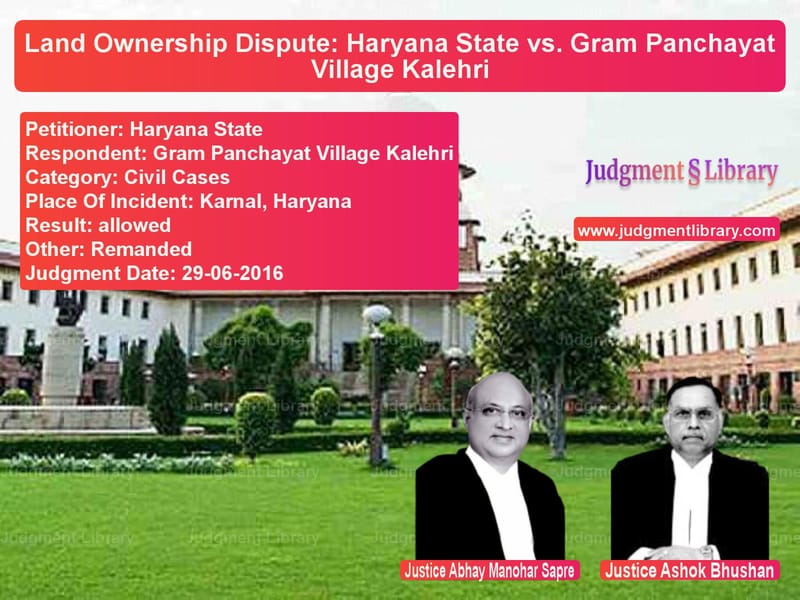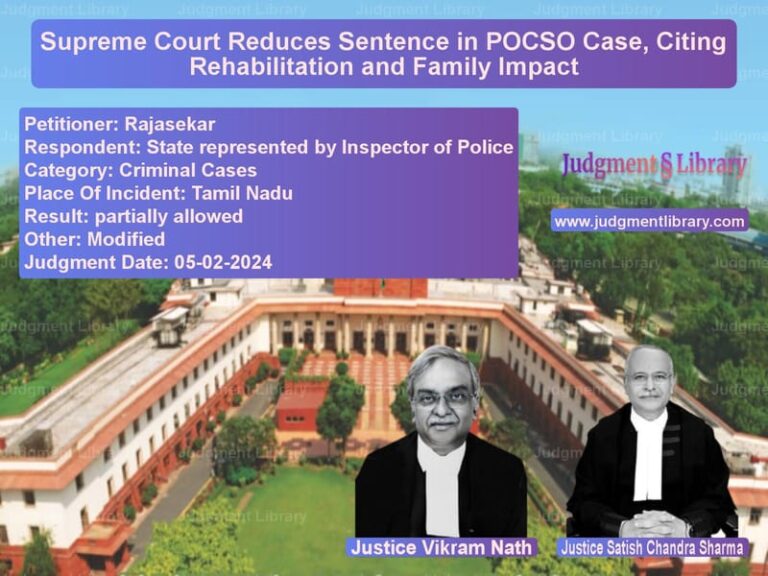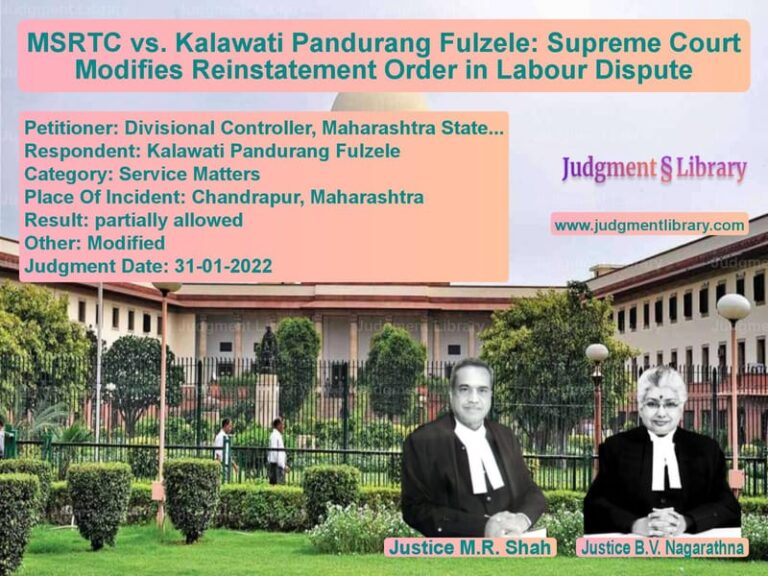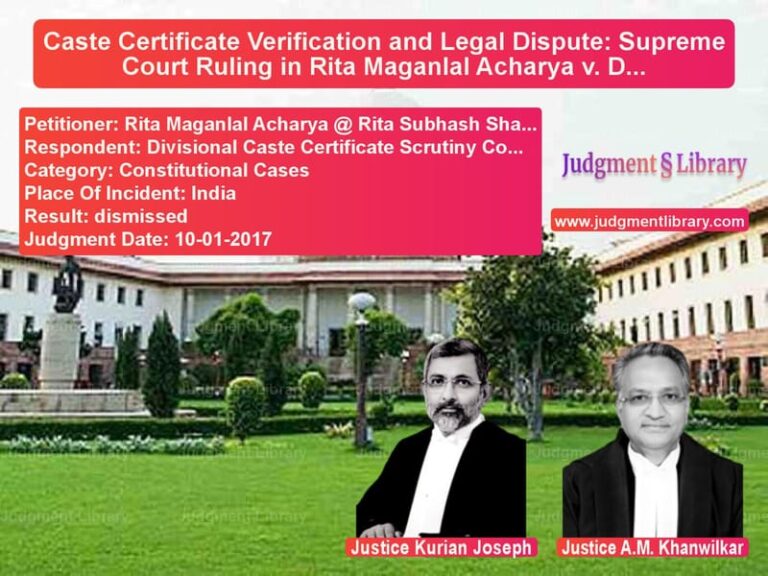Land Ownership Dispute: Haryana State vs. Gram Panchayat Village Kalehri
The case of Haryana State vs. Gram Panchayat Village Kalehri revolves around a land ownership dispute between the State of Haryana and the Gram Panchayat of Kalehri village. The primary legal question was whether the State or the Gram Panchayat had the rightful ownership of a parcel of land measuring 36 kanals and 15 marlas, located in Tehsil Gharaunda, District Karnal.
The Supreme Court, in its ruling, set aside the High Court’s decision and remanded the case for fresh consideration. The judgment emphasized the significance of substantial questions of law in second appeals and the necessity of proper adjudication under Section 100 of the Civil Procedure Code (CPC). Additionally, the Court highlighted the importance of attempting a settlement under Order 27 Rule 5B CPC in cases involving public bodies.
Background of the Case
The Gram Panchayat of Kalehri village filed a civil suit against the State of Haryana, seeking a declaration that they were the rightful owners of the disputed land. They also sought an injunction to prevent the State from interfering in their possession.
The State of Haryana contested the claim, asserting that the land belonged to the government. The dispute, therefore, centered on which party had a legitimate claim to the property.
Key Legal Issues
- Whether the Gram Panchayat or the State of Haryana had legitimate ownership of the land.
- Whether the lower courts correctly interpreted documentary evidence regarding title.
- Whether the High Court erred in dismissing the second appeal without proper adjudication.
- The applicability of Order 27 Rule 5B CPC in resolving disputes involving government entities.
Arguments by the Parties
Petitioner’s (State of Haryana) Arguments
- The State of Haryana had rightful ownership over the land and the Gram Panchayat had no valid claim.
- The lower courts erred in interpreting the title documents.
- The High Court improperly dismissed the second appeal without considering substantial questions of law.
- The matter should be remanded for fresh adjudication.
Respondent’s (Gram Panchayat) Arguments
- The Gram Panchayat had lawful ownership, supported by revenue records.
- The lower courts correctly ruled in their favor after evaluating the evidence.
- The second appeal did not involve any substantial questions of law.
- The case should not be reopened as the findings were already affirmed by two courts.
Trial Court’s Decision
The Trial Court ruled in favor of the Gram Panchayat, holding:
- The Gram Panchayat had successfully established its ownership over the disputed land.
- The State of Haryana had no valid claim.
- The State was permanently restrained from interfering in the Gram Panchayat’s possession.
High Court’s Ruling
The State of Haryana appealed the Trial Court’s decision before the Punjab and Haryana High Court. However, the High Court dismissed the appeal in limine, stating:
“There is no substantial question of law that requires determination under Section 100 CPC.”
The High Court ruled that the findings were purely factual and based on ample evidence.
Supreme Court’s Judgment
The Supreme Court overturned the High Court’s decision and remanded the case for fresh adjudication. The Court observed:
“The appeal does involve substantial questions of law, and therefore, the High Court should have admitted the appeal and framed appropriate questions under Section 100 CPC before deciding it on merits.”
Key Observations by the Court
- The High Court failed to recognize that the case involved crucial legal issues, including interpretation of land ownership documents.
- Proper interpretation of documentary evidence constitutes a legal question and requires judicial scrutiny.
- The High Court committed a jurisdictional error by dismissing the appeal summarily.
- The matter should be remanded for a full hearing and fresh adjudication.
Final Judgment
The Supreme Court allowed the appeal and remanded the case to the High Court with specific directions:
- The High Court must admit the second appeal and frame substantial questions of law.
- The case should be decided after giving both parties an opportunity to present their arguments.
- The Court should consider Order 27 Rule 5B CPC and attempt a settlement between the parties.
- The appeal should be resolved expeditiously within six months.
Conclusion and Legal Impact
This ruling reinforces several key legal principles:
- Second appeals must be properly adjudicated if they involve substantial questions of law.
- Land disputes require thorough scrutiny and cannot be dismissed without full consideration.
- Government entities must engage in settlement efforts under Order 27 Rule 5B CPC.
- Courts have a duty to interpret documentary evidence to determine rightful ownership.
The Supreme Court’s decision highlights the importance of appellate courts exercising their full authority and ensuring that legal disputes are resolved based on proper legal interpretation.
Judgment delivered by: Abhay Manohar Sapre, Ashok Bhushan
Judgment Date: June 29, 2016
The ruling serves as a precedent in land ownership disputes and appellate procedures, ensuring that appeals are not dismissed without due consideration of legal questions.
Don’t miss out on the full details! Download the complete judgment in PDF format below and gain valuable insights instantly!
Download Judgment: Haryana State vs Gram Panchayat Villa Supreme Court of India Judgment Dated 29-06-2016-1741872443541.pdf
Direct Downlaod Judgment: Direct downlaod this Judgment
See all petitions in Property Disputes
See all petitions in Landlord-Tenant Disputes
See all petitions in Specific Performance
See all petitions in Judgment by Abhay Manohar Sapre
See all petitions in Judgment by Ashok Bhushan
See all petitions in allowed
See all petitions in Remanded
See all petitions in supreme court of India judgments June 2016
See all petitions in 2016 judgments
See all posts in Civil Cases Category
See all allowed petitions in Civil Cases Category
See all Dismissed petitions in Civil Cases Category
See all partially allowed petitions in Civil Cases Category







